CAR-T Cell Therapy Achieves 100% Sustained Remission in Lupus Patients
- Normal Liver Cells Found to Promote Cancer Metastasis to the Liver
- Nearly 80% Complete Remission: Breakthrough in ADC Anti-Tumor Treatment
- Vaccination Against Common Diseases May Prevent Dementia!
- New Alzheimer’s Disease (AD) Diagnosis and Staging Criteria
- Breakthrough in Alzheimer’s Disease: New Nasal Spray Halts Cognitive Decline by Targeting Toxic Protein
- Can the Tap Water at the Paris Olympics be Drunk Directly?
CAR-T Cell Therapy Achieves 100% Sustained Remission in Lupus Patients
- Should China be held legally responsible for the US’s $18 trillion COVID losses?
- CT Radiation Exposure Linked to Blood Cancer in Children and Adolescents
- FDA has mandated a top-level black box warning for all marketed CAR-T therapies
- Can people with high blood pressure eat peanuts?
- What is the difference between dopamine and dobutamine?
- How long can the patient live after heart stent surgery?
CAR-T Cell Therapy Achieves 100% Sustained Remission in Lupus Patients
CAR-T cell therapy successfully treats a variety of autoimmune diseases including lupus erythematosus, achieving sustained remission in 100% of patients.
Systemic lupus erythematosus (SLE) is a severe autoimmune disease, with an incidence rate of only 0.1% in the general population, mainly affecting young women. It is estimated that there are more than 1 million SLE patients in China, with an average age of onset of 30.7 years, and the incidence rate in women is 12 times that in men.
In recent years, the long-term survival of patients with systemic lupus erythematosus has improved, but the inevitable disease relapse and the irreversible organ damage it causes remain important causes of death among patients, with a mortality rate 3-4 times higher than that of the general population. Therefore, there is an urgent need for new treatment methods to achieve sustained relief of symptoms, control organ damage, improve long-term survival of patients, and even achieve complete cure.
In recent years, some clinical studies have shown that CD19-targeted CAR-T cell therapy has produced good therapeutic effects in patients with systemic lupus erythematosus, bringing a new, safe, and effective treatment option for them.
On February 22, 2024, Professor Georg Schett’s team at Friedrich-Alexander-University Erlangen-Nürnberg (FAU) published a research paper titled “CD19 CAR T-Cell Therapy in Autoimmune Disease — A Case Series with Follow-up” in The New England Journal of Medicine (NEJM).
The paper reported that 15 patients with autoimmune diseases (8 with systemic lupus erythematosus, 4 with systemic sclerosis, and 3 with idiopathic inflammatory myopathy) regained a new life after receiving CAR-T cell therapy, with no symptoms or need for new treatment. The first group of patients to receive treatment has maintained a disease-free state for more than two years. This result has ignited hope for the complete cure of autoimmune diseases.
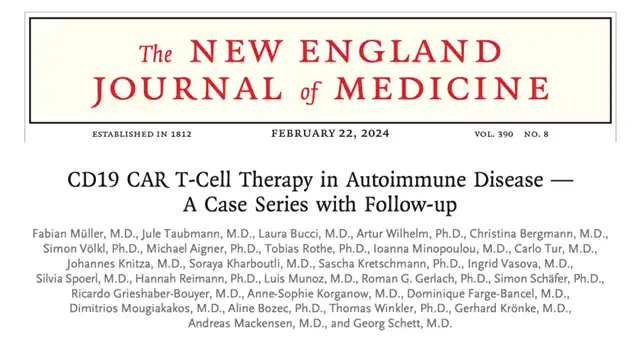
Specifically, during a median follow-up of 15 months, all 15 patients achieved significant remission, with no symptoms or need for new treatment, and all patients completely stopped immunosuppressive therapy. In terms of safety, 10 patients experienced grade 1 cytokine release syndrome, 1 patient each experienced grade 2 cytokine release syndrome, grade 1 immune effector cell-associated neurotoxicity syndrome, and pneumonia requiring hospitalization, and no serious adverse events occurred.
These clinical trial data indicate that CD19-CAR-T cell therapy appears to be feasible, safe, and effective in three different autoimmune diseases, laying the foundation for further controlled clinical trials.
CAR-T cell therapy is a T-cell-based gene engineering therapy that collects T cells from patients, performs genetic engineering in the laboratory to express chimeric antigen receptors (CARs), then expands the cells, and reinfuses them as a “living cell drug” back into the patient. In 2017, the first CAR-T cell therapy was approved by the FDA, and currently, six CAR-T cell therapies have been approved by the FDA for the treatment of B-cell leukemia, lymphoma, and other hematologic cancers, showing strong therapeutic effects.
The most commonly used CAR-T cell therapy is CD19-targeted CAR-T cell therapy, which targets B cells highly specific and universally expressed surface antigen CD19 to treat B-cell cancers.
For systemic lupus erythematosus, patients include the immune tolerance of nuclear antigens such as double-stranded DNA (dsDNA) and nucleoproteins, leading to reduced T lymphocytes, decreased regulatory T cell function, and excessive proliferation of B cells, resulting in the production of large amounts of autoantibodies against dsDNA and other nuclear antigens.
Since the response of B cells to DNA and nuclear antigens precedes the onset of clinical symptoms, depletion of B cells is an attractive new strategy for treating systemic lupus erythematosus.
As early as August 5, 2021, Professor Georg Schett and others at Friedrich-Alexander-University Erlangen-Nürnberg (FAU) published a clinical research paper in The New England Journal of Medicine (NEJM), applying CAR-T cell therapy for the first time to the treatment of systemic lupus erythematosus and successfully treating a young female patient.
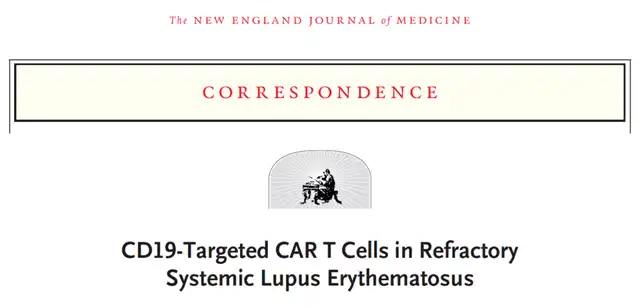
In this study, the research team used CD19-targeted CAR-T cell therapy to treat a 20-year-old female patient with severe systemic lupus erythematosus.
The 20-year-old young woman suffered from severe systemic lupus erythematosus and multiple organ failure, and doctors judged that she did not have much time left. The research team considered using CAR-T cell therapy to treat systemic lupus erythematosus, but this had only been studied in mice before and had not been tried in humans, and CAR-T cell therapy could have serious side effects. Patients must first undergo intensive chemotherapy to kill many existing immune cells in the body. Therefore, the research team was very concerned that the treatment would go wrong, but the patient insisted on trying CAR-T cell therapy. She thus became the first patient in the world to receive CAR-T cell therapy for systemic lupus erythematosus.
Fortunately, CAR-T cell therapy quickly relieved her condition, which can be said to be a “complete recovery,” and she had no obvious side effects. Now, two and a half years later, she still maintains complete remission without the use of any immunosuppressive drugs.
One year later, in September 2022, Professor Georg Schett’s team reported in Nature Medicine on another 5 patients with refractory systemic lupus erythematosus (4 women and 1 man) who improved after CAR-T cell therapy, with no relapse during a follow-up of up to 17 months, all achieving drug-free remission.
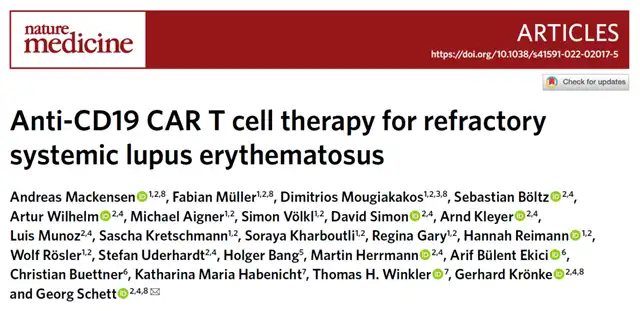
In February 2023, Professor Georg Schett’s team and others published a clinical research paper in The Lancet, successfully treating a new autoimmune disease, idiopathic inflammatory myopathy, with CAR-T cell therapy.
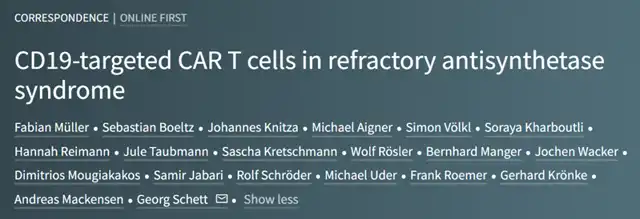
This previously healthy middle-aged man suddenly deteriorated, having difficulty walking and standing. Further examination showed that he had a subtype of idiopathic inflammatory myopathy, anti-synthetase antibody syndrome, a severe autoimmune inflammatory muscle disease that can be fatal if diagnosed too late or if the patient does not respond well to immunosuppressive drugs. The disease is caused by the immune system mistakenly attacking the aminoacyl-tRNA synthetases involved in amino acid synthesis, affecting the function of various cells, involving muscles, joints, skin, lungs, and other organs.
The research team used CD19-targeted CAR-T cell therapy to successfully treat this patient. Six months after CAR-T cell therapy, the patient completely recovered from the autoimmune disease and no longer needed immunosuppressive drugs.
This is the world’s first successful treatment of anti-synthetase antibody syndrome using CAR-T cell therapy, and it is the second autoimmune disease successfully treated by CAR-T cell therapy after systemic lupus erythematosus.
In addition to systemic lupus erythematosus and idiopathic inflammatory myopathy, Dr. Fabian Müller also reported on a third autoimmune disease treated with CAR-T cell therapy — systemic sclerosis, also known as scleroderma, a systemic autoimmune disease characterized by localized or diffuse skin thickening and fibrosis, also known as scleroderma. The lesions are characterized by fibroblast proliferation and onion-like changes in blood vessels, leading to skin hardening, vascular
ischemia, and affecting multiple organs such as the heart, lungs, and digestive tract.
In his report, Dr. Fabian Müller said he was often amazed at the remarkable effects of CAR-T cell therapy on these young patients with autoimmune diseases, such as this patient with idiopathic inflammatory myopathy, who had difficulty walking 10 meters before treatment, but now he can walk 10 kilometers regularly. These young patients with autoimmune diseases who received CAR-T cell therapy spent more time with doctors than with friends before, describing taking medication as eating. Now, with the help of CAR-T cell therapy, these unfortunate events have disappeared.
Furthermore, researchers from the University of Magdeburg in Germany published a clinical research paper in The Lancet Neurology, successfully treating a fourth autoimmune disease, myasthenia gravis, with CD19-targeted CAR-T cell therapy.
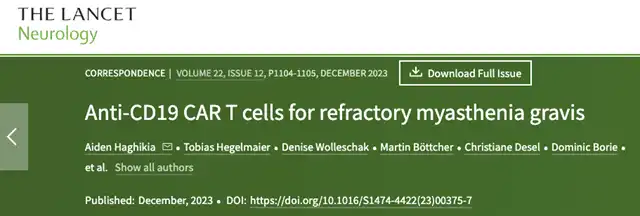
The 33-year-old female patient had generalized myasthenia gravis, experiencing difficulty swallowing and breathing from November 2021 to May 2023, unable to walk without assistance, and experiencing several myasthenic crises, leading to her being admitted to the ICU five times and requiring invasive mechanical ventilation, but these treatments failed to stabilize her condition.
The research team treated her with CD19-targeted CAR-T cell therapy, and two months after treatment, her muscle strength and fatigue improved, serum results were consistent with this, and she is now able to steadily increase the time she can horizontally stretch her arms and her ability to walk without any support devices has also improved.
It is worth mentioning that on April 10, 2023, Pharmaron announced that the new drug clinical trial application (IND) for relma-cel injection for the treatment of moderate to severe refractory systemic lupus erythematosus had received implicit approval from the National Medical Products Administration (NMPA) of China and is currently undergoing phase 1 clinical trials.
CAR-T cell therapy pioneer Professor Carl June wrote in a commentary article in Cell that although CAR-T cell therapy for lupus erythematosus still needs larger-scale studies and longer-term follow-up to confirm, its treatment results are very promising. In fact, these studies suggest that lupus erythematosus may be a more promising target for CAR-T cell therapy than B-cell tumors. In addition, the number of B cells driving disease in lupus erythematosus is much lower than in B-cell tumors, so CAR-T cell therapy for lupus erythematosus and other autoimmune diseases may require lower doses, which will greatly reduce the problem of immunotherapy side effects.
Paper link :
1. https://www.nejm.org/doi/full/10.1056/NEJMoa2308917
2. https://www.nejm.org/doi/full/10.1056/NEJMc2107725
3. https://www.nature.com/articles/s41591-022-02017-5
4. https://doi.org/10.1016/S0140-6736(23)00023-5
5. https://doi.org/10.1016/S1474-4422(23)00375-7
6. https://doi.org/10.1016/j.cell.2022.10.026
CAR-T Cell Therapy Achieves 100% Sustained Remission in Lupus Patients
(source:internet, reference only)
Disclaimer of medicaltrend.org
Important Note: The information provided is for informational purposes only and should not be considered as medical advice.



